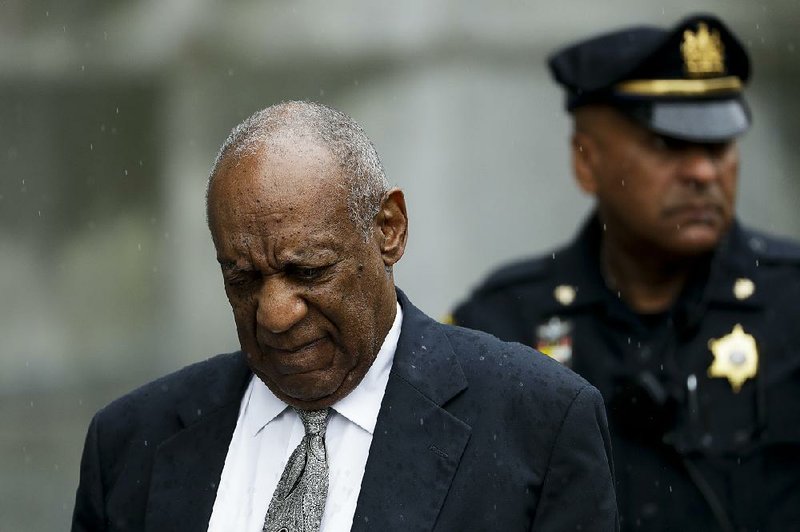NORRISTOWN, Pa. -- Bill Cosby's trial on sexual-assault charges ended in a mistrial Saturday after jurors failed to reach a unanimous decision in the case against the 79-year-old comedian.
Prosecutors vowed to try again, declaring the woman who accuses Cosby of drugging and molesting her at his Philadelphia-area home in 2004 is "entitled to a verdict." The jury deliberated more than 52 hours over six days before telling a judge they couldn't agree on whether The Cosby Show star sexually violated Temple University employee Andrea Constand after giving her pills that left her woozy and unable to say no or fight back. The judge then declared a mistrial.
Excoriated by the defense for charging Cosby in the first place, District Attorney Kevin Steele vowed to put him on trial a second time, saying Constand supported the decision.
Cosby's team declared victory, however temporary.
By sowing doubt among one or more jurors, Cosby's lawyers managed to overcome two years of unrelenting bad publicity for their client after the public release of his testimony about drugs and sex, as well as a barrage of accusations from 60 women who stepped forward to accuse him of sexual assault.
Constand told jurors Cosby gave her pills that made her woozy and then molested her as she lay paralyzed on a couch, unable to tell him to stop. The 2004 encounter at Cosby's suburban Philadelphia estate was the only one to result in criminal charges.
Constand is ready to go to trial again, said her lawyer, Dolores Troiani.
"She's a very spiritual woman, she believes things happen for a purpose, and I think the purpose is ... it should encourage other women to come forward and have their day in court."
Troiani acknowledged the difficulty of the case, given the passage of time and the effect of the alleged drugging on Constand's ability to recall details.
The jury failed to reach a unanimous decision on any of the three counts against the comedian, ending the trial without a verdict.
Cosby's team immediately went on the attack.
The entertainer's wife of 53 years, Camille, slammed prosecutors for taking the case to court, calling Steele "heinously and exploitively ambitious" in a statement released after the trial. She also criticized the judge, the accuser's lawyers and the media.
"How do I describe the judge? Overtly arrogant, collaborating with the district attorney," said her statement, which was tweeted by her husband and read by an associate of the public relations firm representing Cosby.
Cosby himself didn't comment, remaining stoic as the judge declared a mistrial, but spokesman Andrew Wyatt declared the star's "power is back. It has been restored."
Cosby had broken barriers as the first black actor to star in a network show, I Spy, in the 1960s and, two decades later, created the top-ranked Cosby Show. He also found success with his Fat Albert animated TV show and starred in commercials for Jell-O pudding.
But it was Cosby's reputation as a public moralist who urged young people to pull up their saggy pants and start acting responsibly that prompted a federal judge to unseal portions of a deposition he gave more than a decade ago as part of Constand's civil lawsuit against him.
Under questioning from her lawyer, Cosby acknowledged that he had obtained several prescriptions for quaaludes in the 1970s for the purpose of offering the powerful sedative to women with whom he wanted to have sex.
Cosby also said he gave Constand three half-tablets of the cold and allergy medicine Benadryl to help her relax before what he insisted was a consensual sexual encounter at his home.
Prosecutors suggested he drugged her with something stronger.
The jurors struggled with their verdict, telling the judge Thursday that they were at an impasse. Judge Steven O'Neill instructed them to keep working toward a unanimous decision. On Saturday, they told O'Neill they were hopelessly deadlocked.
The judge sought to comfort the jurors, at least one of whom fought back tears, calling their deliberation "one of the more courageous acts, one of the more selfless acts that I've seen in the justice system. ... I feel bad for all of you, I really do."
He reminded prosecutors and the defense that "a mistrial is neither vindication nor victory for anybody."
It wasn't immediately known how many jurors wanted to convict and how many wanted to acquit. None of the jurors commented after the trial ended and headed home to the Pittsburgh area, some 300 miles from the courthouse outside Philadelphia.
Constand, now 44, initially went to police about a year after she said Cosby assaulted her, but a prosecutor declared her case too weak to file charges.
A decade later, another district attorney reopened the investigation after Cosby's deposition became public, and dozens of women stepped forward to accuse him. Cosby was charged shortly before the statute of limitations was to expire.
Bruce Castor, the ex-prosecutor who passed on Constand's case in 2005, said Saturday that he was disappointed but not surprised in Steele's failure to win a conviction.
"My opinion continues to be that Ms. Constand was probably the victim of a sexual assault," said Castor, whom Constand is suing for defamation. "'Probably' does not win criminal trials."
A Section on 06/18/2017

